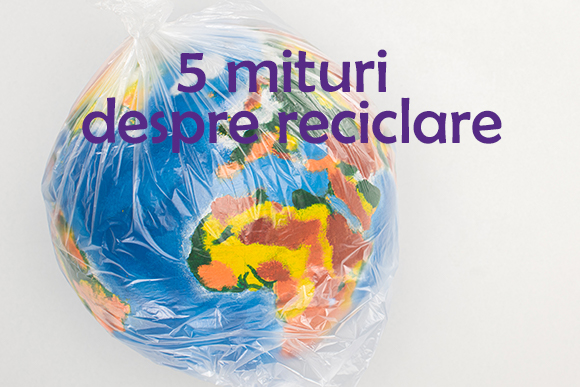5 recycling myths

In a world affected by climate change crisis, recycling remains a fairly important way to reduce waste, to recover valuable materials, to conserve significant amount of energy and water, but also to reduce greenhouse gas emissions or to create new jobs in the recycling and manufacturing industry.
At the same time, the recycling industry is, along with materials’ science and product design, in a continuos change and it remains an activity that can make us feel (and not only) that we could make improvements, no matter how small, to this planet.
Are the bottle caps recyclable? Do the materials need to be recycled? Are biodegradable objects decompose in the landfill? Recycling can be confusing for many of those who practice it, from recognizing the various symbols or even understand the current state of the recycling infrastructures from our own city or country. To recycle more successfully, we chose to dismantle some of the recycling myths and prove that this process is easy to do and has a lot of benefits.
Reduce. Reuse. Recycle. These three steps from the triangle that saves the planet seem extremely easy to do, but in fact, there is, in fact, a lot of information and misconceptions when it comes to recycle.
Here are just a few of the most common recycling myths.
Myth 1: Things cannot be recycled more than once.
Some materials, such as like plastic, have a short recycling time. Usually, they are recycled into a new product which, at its turn, cannot be recycled anymore. Metals such as aluminium, for example, can be recycled more than once without degrading. So does glass. They can be recycled several times. Therefore, if it is possible, make sure you use these materials instead of plastic ones.
Myth 2: Paper towels are recyclable.
This myth is one of the most familiar and the one that always create confusion. Paper is, indeed, recyclable, which would mean that paper towels should also be recyclable, right? Although the paper towels, napkins or handkerchiefs are usually made from recycled paper, they are not recyclable.
Normally, paper can only be recycled a certain number of times before the fibers start to become too short to be used again and this happens also in the paper towels production. The recommendation would be to put these paper towels (including napkins) aside from food waste, so they could they decompose together.
Myth 3: All the biodegradable products can be used as organic waste
The concept of biodegradable means that an element is capable to decompose with the help of bacteria or other living organisms. Just because it is biodegradable does not mean that it can also be transformed successfully transformed into organic waste.
All disposable plates or utensils that are labelled seem like a sustainable alternative. But is it really so? Most of these products, sold as sustainable alternatives to plastic (which has a single use) are not considered recyclable because they cannot be turned into organic waste. They will only decompose in an industrial installation with extremely high heat. In our organic waste bins from the yard or the ones from our homes these products will not decompose. Once got in water – lake, river or ocean, they will be as toxic as plastic. The same goes for a trash can. They cannot be recycled.
Myth 4: The recycle sign is a clear sign that the product is recyclable
Even if the materials from which the product is made are from recyclable sources, the recycling sign from the product does not mean that the object can be recycled. The number in the middle of the symbol must be checked. It points out how much recycled material the packaging contains, whether it is recycled. This way you can find out if your local recycle program will accept or not that kind of plastic, because if you will throw out a product that is not accepted, you risk destroying an entire batch of recycling.
The graphic recycling sign is just a clue for the fact that the product could be or not recyclable, but it is not definitive.
Myth 5: You cannot recycle a lot of plastic products
Most of the products that you have in your house can end up in the recycle bins. From plastic bottles of all kind (shampoo, soap, cleansing gel, detergent) to cans of yoghurt, butterine or ice-cream. Even tough plastic toys whose use you can no longer find or for which you cannot find a new home.
What are the plastic products that you cannot, indeed, recycle and that should end up in the general waste bin:
- Polystyrene
- Plastic film (covering bread, fruit or trays)
- Bubble wrap
- Pill packaging
- Toothpaste tubes
- Plastic straw
Can we get rid of all plastic packaging? Unfortunately no. And some of them will really be inevitable to get rid of. But there are solutions. Consumers can start using more recycled and recyclable materials – for example #deAzi recipients. Ruling out the disposable materials is possible, but we need a solution and innovation that involves us all.
